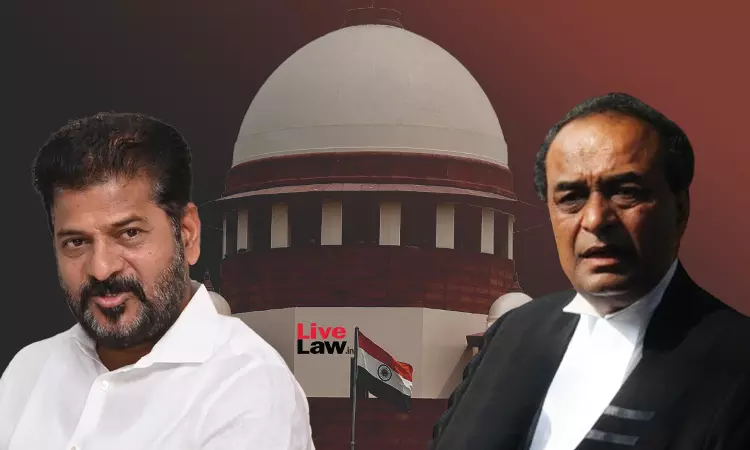Telangana CM Revanth Reddy's Prosecution In 2015 'Cash-for-Votes' Case Unsustainable : Mukul Rohatgi To Supreme Court
Amisha Shrivastava
15 Oct 2025 2:57 PM IST

The Supreme Court on Wednesday (October 15) heard Telangana Chief Minister Revanth Reddy's plea seeking to quash the 2015 "Cash for Votes" case, as per which he is alleged to have offered bribe to an MLA for securing votes in the Legislative Council election.
The bench comprising Justice JK Maheshwari and Justice Vijay Bishnoi heard the matter.
Senior Advocate Mukul Rohatgi, appearing for Revanth Reddy, told the Court that the trap laid by the Anti-Corruption Bureau (ACB) in the 2015 cash-for-vote case was “completely illegal” as it was conducted before the registration of any First Information Report (FIR).
Rohatgi submitted before the Bench that no investigation can commence under the Code of Criminal Procedure (CrPC) without registration of an FIR. “A trap was set up before an FIR was registered. The trap is completely illegal because no investigation can commence before registration of FIR under the CrPC. There was no general diary entry and no FIR,” he said.
He pointed out that three persons were allegedly caught offering a bribe in the trap, and that Revanth Reddy was being prosecuted under Section 12 of the Prevention of Corruption Act, 1988, as it stood in 2015. Section 12 then dealt with abetment of offences under Sections 7 and 11, which applied only to bribe takers and not bribe givers.
“I am being prosecuted under Section 12 of the PC Act as it stood in 2015. It relates to abetment of offences under Sections 7 and 11. But in 2010, bribe givers were not covered under those provisions, only bribe takers were,” Rohatgi submitted, adding that the bribe giver was brought within the ambit of the law only after the 2018 amendment.
He argued that even assuming the allegations attracted Sections 7, 11, and 12, those provisions applied only to acts done by a public servant in the discharge of official duty. Casting or abstaining from voting in a Legislative Council election, he said, was not an official act within the meaning of the law.
Continuing his submissions, Rohatgi took the Court through the provisions of the Prevention of Corruption Act, 1988, as they existed in 2015, to argue that the prosecution of Revanth Reddy, as an alleged bribe giver, was legally unsustainable.
Reading out Section 12 of the Act, Rohatgi said that at the time, the provision punished “whoever abets an offence under Sections 7 and 11,” whether or not the act was actually committed .
“Whoever abets an offence under Sections 7 and 11, whether that offence is committed or not, shall be punishable,” Rohatgi said, explaining that Section 12 was confined to abetment of those two specific offences.
He then took the Bench through Sections 7 and 11, pointing out that those sections, as they then stood, applied only to bribe takers, i.e., public servants who accepted or attempted to accept undue advantage.
Justice Maheshwari observed, “So earlier it was abetment of Sections 7 and 11, and now…?”
Rohatgi replied that after the 2018 amendment to the Prevention of Corruption Act, Section 12 was widened to cover abetment of any offence under the Act, which he said was “logical,” but that change could not be applied retrospectively to offences alleged to have occurred in 2015.
“Now it is abetment of any offence in the whole Act, which is logical,but that was not the position earlier,” he submitted.
The hearing will continue tomorrow.
Last month, the Supreme Court had approved the judgment of the Telangana High Court which quashed the case againt another accused in the case, Jersualem Mathai.
The case revolves around allegations of offering bribe to then-nominated MLA Elvis Stephenson during the MLC Elections for Legislative Council. The bribe was purportedly aimed at securing Stephenson's vote in favor of the Telugu Desam Party (TDP). Revanth Reddy was then a member of TDP.
Case : A Revanth Reddy v. State of Telangana | Special Leave Petition (Criminal) No. 5333 of 2021


